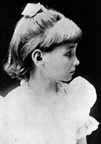 |
| Helen Keller as a young child (http://www.educatorskonnect.com/ CurriculumPortals/HelenKeller/ YoungHelen.jpg) |
On June 27th, 1880, the Kellers had their first daughter whom they named Helen Adams Keller. Helen Keller lived in a simple, white, clapboard house that was built in the 1880's by her grandparents. Her father was known as Captain Arthur Henley Keller because he used to be in the Army during the American Civil War. Helen’s mother, Kate Adams Keller, was a tall lady with blond hair and blue eyes. She would always try to save a bunch of money by making her own food like bacon, ham, butter and even lard. Both parents were cotton plantation owners, along with being editor of the local weekly newspaper.
At the age of nineteen months old, Helen Keller caught a sickness that made her lose her sight and her hearing. The doctors called it “brain fever.” Since she couldn’t see or hear, her parents let her get away with everything. For example, at dinner time, they let her walk around the table picking food off of all their plates with her hands. Whenever she had a bad temper, which happened often, her parents gave her a candy because they said that it was the only thing they could do to calm her down. The major goal that Helen wanted to achieve was to be able to communicate with her family.
Helen was a very young girl who had many problems in life since her hearing and sight were completely gone. That meant that Helen would never be able to see or hear anything again for as long as she lived. Helen was considered a hero because she overcame the most important things in life that people always take for granted. With a lot of hard work and the high cost of hiring Anne Sullivan as her teacher/tutor, Helen learned how to live a normal life by speaking to other people with her own two hands. By the age of 36, Helen was helping blind people to speak with their hands just like she did.
 |
| Graduation (www.npr.org/.../disability/ images/lc0001aa.jpg) |
With the help of her teacher, Anne Sullivan, Helen was able to get into Radcliffe College. A few years later, she graduated with a B.A. with Honors. After that, Helen became a world famous advocate for social equalities. In 1964, Helen Adams Keller was awarded the Presidential Medal of Freedom by President Lyndon Johnson.
In 1921, Helen’s mother died from an unknown illness. In 1932, Anne’s ex-husband, John Macy, died, and then four years later on October 20, 1935, Anne died. After Anne died, Helen and her friend, Polly (who worked for Helen) travelled around the world to Japan, Australia, South America, Europe and even Africa. On March 21, 1960, Polly Thompson died from a severe stroke, and then on June 1st, 1968 at Arcan Ridge in her home, Helen died peacefully in her sleep. She was cremated in Bridgeport. The funeral was held at the National Cathedral in Washington, D.C., where her ashes were disposed next to Anne Sullivan and Polly Thompson.
I decided to choose Helen Keller as my hero because she had many obstacles that she had to overcome. For example, she had to learn how to walk without seeing or hearing, how to eat properly by sitting at the table and eating with a utensil, and, also, how to communicate with the other children and her family. I also chose her because she was considered a very special kid since she couldn't see, talk, or hear. Most children these days have only one out of these three disabilities, but not Helen! The last reason why I chose Helen was because the only thing she had was her senses and that is how she was able to find her mother, by the sense of her perfume. Helen Keller did not have the best life, but at least she was able to achieve her goal. It might have taken her a long time, but she never gave up. Helen Keller was the type of kid that whenever she put her mind to something, she wouldn’t give up. By her not giving up, she showed millions of people that being blind, deaf or having any other kind of illness, isn’t the end of the world.
Page created on 5/2/2005 12:00:00 AM
Last edited 5/2/2005 12:00:00 AM
